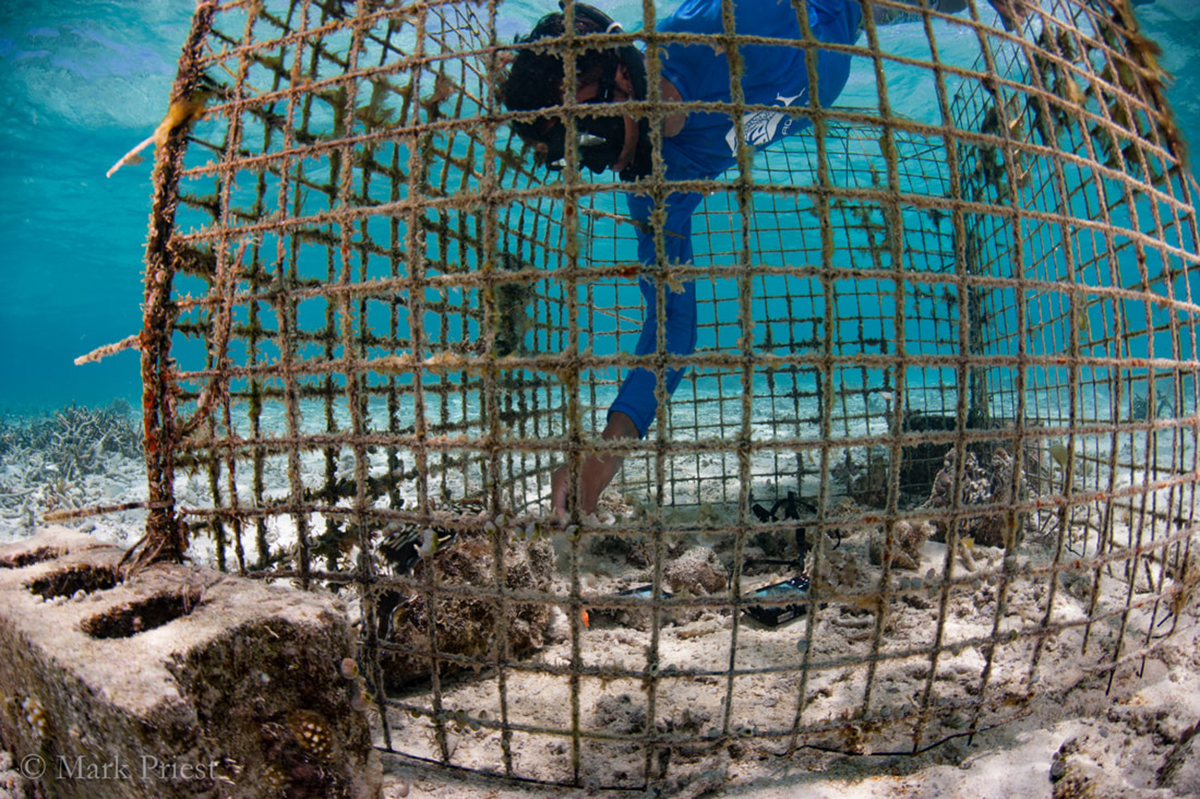Environmental Science PhD Candidate Lincoln Rehm Named John A. Knauss Fellow
By Gina Myers
 Environmental Science PhD candidate Lincoln Rehm examines a giant clam in Palau. Photo by Mark Priest.
Environmental Science PhD candidate Lincoln Rehm examines a giant clam in Palau. Photo by Mark Priest.
August 11, 2021
Many people imagine that there is a typical path for PhD students to follow once they have completed their dissertation and graduated—one that goes from postdoc to professorship. However, this path isn’t for everyone, and it isn’t the path that environmental science PhD candidate Lincoln Rehm sees himself on.
Though he never saw himself going the traditional academic route, Rehm didn’t know what other opportunities might be open to him until a chance meeting while researching giant clams in Palau. There Rehm met a PhD graduate doing contract work for the National Oceanic and Atmospheric Administration (NOAA) who told him about the John A. Knauss Marine Policy Fellowship Program.
Rehm decided to apply to the highly competitive program and recently found out that he was named a fellow. He will be a part of the 43rd class of the fellowship, joining a group of almost 1,500 professionals who have received hands-on experiences transferring science to policy and management through one-year appointments with federal government offices in Washington, DC. These fellows have gone on to become leaders in science, policy and public administration.
The practical application of research has always been of interest to Rehm, who specializes in giant clams and coral reef ecology with a strong interest in making conservation recommendations. This fellowship will allow him to use scientific knowledge for the public good.
“For Lincoln, this is a dream fellowship, since his research on giant clams is significant for policy as much as for science. With his Palauan heritage, Lincoln knows first-hand how ocean resources in general and giant clams in particular are vitally important to the island nation's food security, economy and environmental health,” says Richard McCourt, PhD, professor of biodiversity, earth and environmental science. “Lincoln has always kept these real-world priorities foremost in his graduate career, and so being able to work in the legislative or executive branches of the federal government is a tremendous opportunity to use his skills in something that he is passionate about: ocean sustainability.”
McCourt co-advises Rehm’s dissertation with Alison Sweeney, PhD, associate professor of ecology and evolutionary biology at Yale, and he sees great promise for Rehm’s future. “Lincoln is an ingenious, intrepid and very hard worker who is undaunted in getting things done in the field. He has overcome unpredictable weather and disruptions to field experiments, difficulty in working in the uncontrolled natural world, and the usual hurdles involved with getting equipment to work—not to mention the added burden of finishing up the work in an unprecedented pandemic.”
He adds, “I see a great potential [for Lincoln] to take on major ecological projects in coastal areas that will address serious ocean issues of sea level rise, ocean warming and acidity, and conservation of keystone species. He will bring to bear his experience in basic research to tackle the very serious challenges ahead of us in managing the ocean.”
Though he has been named a fellow, Rehm does not yet know where he will be placed. Fellows first select whether they would like to do legislative or executive work. Then the fellows discover what opportunities are available in their chosen area and interview with the organizations and rank them, similar to how medical students rank residencies for Match Day. Rehm expects to know where he will be working sometime in October, with the one-year appointment beginning in February 2022.
The process of applying has already opened Rehm’s eyes to the various career possibilities open to him and other scientists. “The fellowship gives people with masters and PhDs opportunities to learn how they fit into a government-centric role,” he explains. “There are tons of different opportunities with all kinds of agencies. For example, I never would have thought of working for the Coast Guard or Navy, but they offer science opportunities where people can really make an impact.”
Regardless of which agency he lands with, Rehm is looking forward to the experience and how he sees it impacting his future. “I am hoping to get an understanding of how I could fit into a role working for some of these agencies,” he says. “I want to figure out how I can use myself as a tool to do good things and make positive changes in communities that really need it—specifically coastal communities that are being affected by climate change and other changes happening in their environment.”
Are you a College of Arts and Sciences student, faculty, staff or alumni with something newsworthy to share? Contact Gina Myers, content coordinator, at gmm94@drexel.edu.